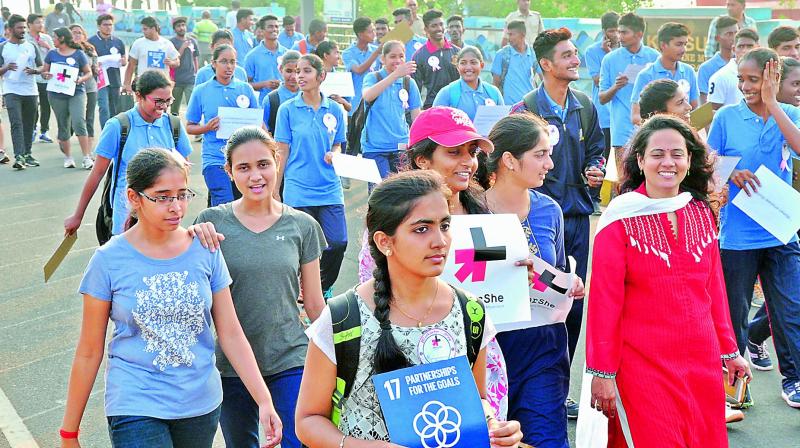Let us take a pledge to make the world a better, fairer, safer place for women

March 8 is a day of celebration, of acclaiming the achievements that women have made through their struggles for emancipation from various bondages holding them back for long and towards equality in many spheres. But many more significant changes are still needed, and further progress required in bringing about an attitudinal change in society for women to truly observe their special day. We need more women heading social, economic and political bodies, equality in realising their rights — be it in the fields of education, health, employment, social security and freedom from violence and abuse against them. This is of course not to undermine the significance of key women role models, of whom there are plenty across countries and in different fields whom we must salute on the International Day of Women (IDW) as they continue to balance for a better life as well as get admired by both men and women for their contributions.
Building a gender-balanced world is not easy, but it is doable if we work continuously around it, have a direction and galvanise societal action towards it. Be it in schools, colleges, workplaces, at home, in policies, programmes, social protection benefits and access to facilities and provisions — in all areas, gender balance is needed for women to be able to enjoy human rights and live a better life, of dignity and respect. While in many countries the empowerment of girls and women is taking place, there are still roadblocks. The Commission on the Status of Women quite rightly presses upon individuals and communities to examine the ways in which barriers can be removed and progress accelerated for gender equality, gender-responsive social systems which build services and infrastructure that meet the needs of women and girls.
The Sustainable Development Goals (SDGs) 2030 Agenda, towards which all governments are striving is an opportunity to end all forms of discrimination, exploitation and violence across the lifespan against all women and girls everywhere. The fulfilment of SDGs is resulting in advancing the status of women worldwide. No doubt women’s participation as equal partners with men in the social, economic, and political fields across the globe is an outcome of internationally agreed strategies, especially over the past few decades, but we still need to focus on innovative ways to remove structural barriers and ensure that every girl and woman is able to access education, health, avail opportunities for a better life and not be left behind.
Societies are rapidly changing due to developments in science, technology, information systems, and many socio-economic and cultural transformations. It is imperative that women are empowered irrespective of where they live — in rural or urban areas — to be able to cope with these changes and not be under-represented as new opportunities emerge. Governments must work towards building more inclusive systems, especially in meeting the daily needs of women and girls, whether it is in terms of providing basic or special services, infrastructure, transport, safe and secure public and private spaces. Women need balance for a better life, not just for existence, for their growth, for their aspirations, for their relationships at home and at the workplace.
Attaining gender balance will require encouraging women’s leadership, political participation, holding leading positions in business, the private sector and government offices. Investing in giving women economic empowerment through paid or unpaid work, providing them peaceful, safe and secure environments free from abuse, violence and exploitation, and making them part of the decision-making process, especially when it affects them, allowing them real choices which are necessary to maintain a better balance in society. All this may not be easy to attain as many hurdles and pitfalls come in the way of achieving gender equality and granting women their rights, but all governments and members of civil society must keep making efforts towards national plans, policies and attitudinal changes which allow for the empowerment of women and translate in practical terms in bringing about gender equality.
An important task in empowering women is to elevate their voices at home, at the workplace and beyond. An increase in their representation and participation in decision-making can go a long way in achieving gender balance, equality and parity. Activists must examine ways in which barriers for women’s empowerment and realisation of their rights are removed. The celebration of the International Women’s Day calls for giving strength to women, support their specific agenda or cause and reflect on their achievements, as well as consider further advocacy and action for hope of a balanced better life. Since the early 1900s, women’s oppression and inequality has slowly but definitely undergone a change and we need to applaud all those forces which have made this happen, be it in the United States, Britain, Germany, Denmark, Finland, Italy, Austria, Switzerland and many countries in Europe and elsewhere in Africa, Oceania and Asia, including India. The role of men in women’s campaigns has been noteworthy, especially for women’s rights to work, vote, be trained for their vocation, hold public office and end discrimination at all levels. Labour legislation, improvement in working conditions, in maternal health, reduction in female mortality, higher life expectancy, and wage parity — all these have been energised and accomplished through movements in different parts of the world.
Let us keep up the momentum and provide further direction and support to women in achieving much more in all aspects through this year’s IWD campaign for “balance for better” worldwide with active participation of all stakeholders; and yes of course, with you and me too.

